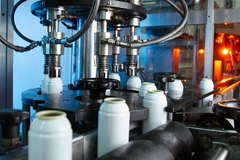Tata Steel Nederland commissions food can-making machine to conserve resources
Tata Steel Nederland has commissioned a dry-forming can-maker at its R&D facilities. The machine is said to eliminate the need for emulsified water through its dry-forming process, reducing energy use. The steel-making company says that the cans produced are ready for future food safety standards. Tata Steel Nederland has accepted the machine, which is now operational.
“The big difference between existing can-making machines and our solution is that our solution uses tin-free polymer-coated material,” Joris Essing, marketing manager at Tata Steel Nederland, tells Packaging Insights.
“The second difference is that, enabled by this polymer-coating, we use a dry can-making process. Where existing processes are wet, using emulsified water for cooling, we have developed internally cooled tooling enabling a dry can-making process. Apart from environmental benefits, this also significantly reduces the capital expenditure (CAPEX) needed for a machine.”
The new line can reportedly produce up to 400 cans per minute, which is 25% higher than the industry standard of 320.
Essing highlights the following benefits of the can-maker:
- Sustainable choice: Tin-free, reducing natural gas and VOC (Volatile Organic Compound) emissions
- Superior performance: Food safe, wide range of fill goods with a single-coating formulation
- Efficient supply chain: Lean can-making, lacquer-free, shorter lead times, reduced CAPEX, and inventory.
According to the company, the machine at Tata Steel serves as a proof of concept. Customers can observe the dry-forming process with Protact in action at full industrial speeds.
Essing explains: “Tata Steel Nederland is a material supplier, not a can-maker, and we do not intend to make commercial cans.”
“We have developed both the polymer-coated material (with IP) and the dry can-making process (with IP), which, if combined, we see as the future of can-making.”
Polymer-coated for food-safety
 Tata Steel’s dry-forming process uses Protact steel and an advanced cooling of tooling.The Tata Steel dry-forming process is made possible by its use of Tata Steel Protact polymer-coated steel and the advanced cooling of the tooling.
Tata Steel’s dry-forming process uses Protact steel and an advanced cooling of tooling.The Tata Steel dry-forming process is made possible by its use of Tata Steel Protact polymer-coated steel and the advanced cooling of the tooling.
“Food safety is facilitated by a very simple chemistry of the polymer coating with hardly any active components that might lead to safety issues. The challenge with lacquers (that are applied in the traditional process) is that they do have a complex chemistry with active components that might lead to food safety issues,” explains Essing.
Hans van der Weijde, director of R&D at Tata Steel Nederland, adds: “The polymer layer ensures that the cans can meet all future food safety standards. There’s no need to apply a lacquer to the steel. While lacquer is still allowed under current regulations, we see a clear trend toward phasing out these chemical coatings. Lacquered cans also often contain tin. Protact allows for a shorter and cleaner production line.”
Tata Steel’s dry-forming process with Protact has already been brought to market in collaboration with Grupo Calvo on the development of its Protact tuna can. The polymer layer applied to the Protact steel reduces the need for oil to keep the tuna fresh and make it easy to remove from the can, according to Tata Steel.
The tuna packaging is also said to be lighter and easier to transport as a result of the more efficient material use.
Essing says: “Collaboration with the customer is crucial. We have the expertise in the dry-process, but the customer has to make it work on their own production lines. We work closely together to make that happen.”
Sustainable steel production
Essing emphasizes that Tata Steel is “on its way to producing sustainable steel.”
 Tata Steel’s Protact tuna can developed with Grupo Calvo.“This means fewer CO2 emissions, more focus on a clean environment, and an increase in the use of scrap. We call it green, CO2-neutral steel.”
Tata Steel’s Protact tuna can developed with Grupo Calvo.“This means fewer CO2 emissions, more focus on a clean environment, and an increase in the use of scrap. We call it green, CO2-neutral steel.”
He adds that by 2030, Tata Steel plans to produce steel with 40% less CO2 emissions. “And by 2045, we will be a CO2-neutral steel producer.”
“Also, we are increasing circularity. We will reuse more steel, allowing us to produce more sustainably. From 2030 onwards, we will increase the use of scrap from 17% to 30%.”
Tata Steel says that cans are also environmentally sustainable because they can provide long shelf life without refrigeration, reduce food waste, and provide “excellent” recyclability.
“Thanks to their magnetic properties, steel cans are relatively easy and cost-effective to separate from other waste streams. In the Netherlands, steel packaging — such as cans for beans, corn, or fish — is the country’s recycling champion. More than 95% of all steel packaging used in the Netherlands is recycled into new steel, making steel the most recycled packaging material.”












